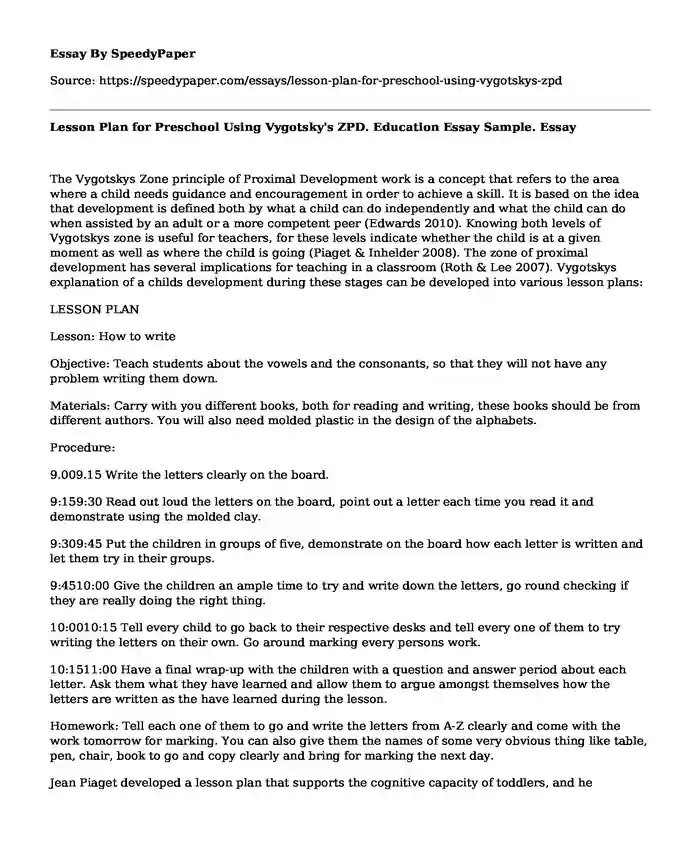The Vygotskys Zone principle of Proximal Development work is a concept that refers to the area where a child needs guidance and encouragement in order to achieve a skill. It is based on the idea that development is defined both by what a child can do independently and what the child can do when assisted by an adult or a more competent peer (Edwards 2010). Knowing both levels of Vygotskys zone is useful for teachers, for these levels indicate whether the child is at a given moment as well as where the child is going (Piaget & Inhelder 2008). The zone of proximal development has several implications for teaching in a classroom (Roth & Lee 2007). Vygotskys explanation of a childs development during these stages can be developed into various lesson plans:
LESSON PLAN
Lesson: How to write
Objective: Teach students about the vowels and the consonants, so that they will not have any problem writing them down.
Materials: Carry with you different books, both for reading and writing, these books should be from different authors. You will also need molded plastic in the design of the alphabets.
Procedure:
9.009.15 Write the letters clearly on the board.
9:159:30 Read out loud the letters on the board, point out a letter each time you read it and demonstrate using the molded clay.
9:309:45 Put the children in groups of five, demonstrate on the board how each letter is written and let them try in their groups.
9:4510:00 Give the children an ample time to try and write down the letters, go round checking if they are really doing the right thing.
10:0010:15 Tell every child to go back to their respective desks and tell every one of them to try writing the letters on their own. Go around marking every persons work.
10:1511:00 Have a final wrap-up with the children with a question and answer period about each letter. Ask them what they have learned and allow them to argue amongst themselves how the letters are written as the have learned during the lesson.
Homework: Tell each one of them to go and write the letters from A-Z clearly and come with the work tomorrow for marking. You can also give them the names of some very obvious thing like table, pen, chair, book to go and copy clearly and bring for marking the next day.
Jean Piaget developed a lesson plan that supports the cognitive capacity of toddlers, and he explained it in a few simple steps as below:
Explain Piagets theory of cognitive development.
Define and use key terms correctly.
Describe the six assumptions of Piagets theory (Edwards 2010).
Show a short video clip of a child or children playing.
Reference
Edwards, A. (2010). How can Vygotsky and his legacy help us to understand and develop teacher education. Cultural-historical perspectives on teacher education and development, 63-77.
Piaget, J., & Inhelder, B. (2008). The psychology of the child. Basic books.
Roth, W. M., & Lee, Y. J. (2007). Vygotskys neglected legacy: Cultural-historical activity theory. Review of educational research, 77(2), 186-232.
Cite this page
Lesson Plan for Preschool Using Vygotsky's ZPD. Education Essay Sample.. (2019, Nov 08). Retrieved from https://speedypaper.com/essays/lesson-plan-for-preschool-using-vygotskys-zpd
Request Removal
If you are the original author of this essay and no longer wish to have it published on the SpeedyPaper website, please click below to request its removal:
- Free Essay That Includes the Project Planning Template
- Technology Has Been Used to Sexually Exploit Children - Free Essay
- Essay Sample Answering Why Look at Animals through the Viewpoint of Winged Migration
- Free Essay Example on Hot Spots Policing
- Essay Sample: Effects of Marine Activity on MPA
- Functionality Of The Cell
- Free Essay Example - Auguste Renoir
Popular categories





